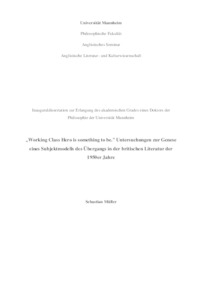|
„Working Class Hero is something to be.” Untersuchungen zur Genese eines Subjektmodells des Übergangs in der britischen Literatur der 1950er Jahre
Müller, Sebastian
![[img]](https://madoc.bib.uni-mannheim.de/41565/1.hassmallThumbnailVersion/Dissertation%20Sebastian%20Mueller%20Working%20Class%20Hero.pdf)  Vorschau |
|
PDF
Dissertation Sebastian Mueller Working Class Hero.pdf
- Veröffentlichte Version
Download (1MB)
|
|
URL:
|
https://madoc.bib.uni-mannheim.de/41565
|
|
URN:
|
urn:nbn:de:bsz:180-madoc-415650
|
|
Dokumenttyp:
|
Dissertation
|
|
Erscheinungsjahr:
|
2017
|
|
Ort der Veröffentlichung:
|
Mannheim
|
|
Hochschule:
|
Universität Mannheim
|
|
Gutachter:
|
Winkgens, Meinhard
|
|
Datum der mündl. Prüfung:
|
15 Dezember 2016
|
|
Sprache der Veröffentlichung:
|
Deutsch
|
|
Einrichtung:
|
Philosophische Fakultät > Anglistik II (Winkgens -2015, Em)
|
|
Fachgebiet:
|
820 Englische Literatur
|
|
Normierte Schlagwörter (SWD):
|
Englisch , Literatur , Kultur , Großbritannien , Geschichte , Nachkriegszeit
|
|
Freie Schlagwörter (Deutsch):
|
Englisch , Literatur , Kultur , Großbritannien , Geschichte , Nachkriegszeit
|
|
Freie Schlagwörter (Englisch):
|
British Literature , Cultural Studies , Great Britain , 1950s
|
|
Abstract:
|
"Working Class Hero is something to be" singt John Lennon im Jahr 1970 und erkennt mit diesen Zeilen ein bereits seit den 1950er Jahren etabliertes Subjektmodell. Gefangen zwischen den Welten der verheißungsvollen aber fremden upper classes und der bereits entfremdeten aber retrospektiv idealisierten Herkunftskultur der working class reaffirmieren die beiden "original angry young men" Jimmy Porter und Joe Lampton ihre verunsicherte Klassen- und Genderidentitäten durch den Rückgriff auf das Subjektmodell des Working Class Hero, das eine authentische Emotionalität ins Zentrum wahrer Subjekthaftigkeit stellt. Der Working Class Hero bleibt als Subjektmodell in Literatur, Film und medialer Öffentlichkeit über die 1950er Jahre hinaus bis in die Gegenwart erhalten: An der kulturellen Peripherie existiert das Subjektmodell als Identitätsangebot für Individuen, die ihre eigene Subjekthaftigkeit als eine scheiternde wahrnehmen – und als ein Reservoir möglicher Identitätsmodi und Versatzstücke für das multivalente Kreativsubjekt der Postmoderne.
|
|
Übersetzung des Abstracts:
|
“Working Class Hero is something to be”, John Lennon sings and he might mean: “at least something”. Thus it becomes understandable that the “original angry young men” Jimmy Porter and Joe Lampton fall back on this mythologically charged mode of subcultural subject formation when they are trapped in-between the brave new world of the upper class(es) and the formerly condemned as dead, now idealized as emotionally nurturing social underworld of their working class origins. A closer look reveals that both are not only in class-trouble, but also in a gender-conflict; and with their pride and masculinity at stake, Joe and Jimmy strive for compensations for their frustration: Both of them produce themselves as typical working class heroes in the fashion of their long tradition from Stephen Blackpool over D.H. Lawrences protagonists to Arthur Seaton. And the working class hero slowly but unstoppably steps out of the depths of his former realms into the lights of social attention, becoming a male role model to believe in, and thus now becoming something to really be. In a (post)modern world of shifting identities, the working class hero provides a very simple but effectively reaffirming mode of male identity formation.
(Englisch)
|
 | Dieser Eintrag ist Teil der Universitätsbibliographie. |
 | Das Dokument wird vom Publikationsserver der Universitätsbibliothek Mannheim bereitgestellt. |
 Suche Autoren in Suche Autoren in
Sie haben einen Fehler gefunden? Teilen Sie uns Ihren Korrekturwunsch bitte hier mit: E-Mail
Actions (login required)
 |
Eintrag anzeigen |
|
|
